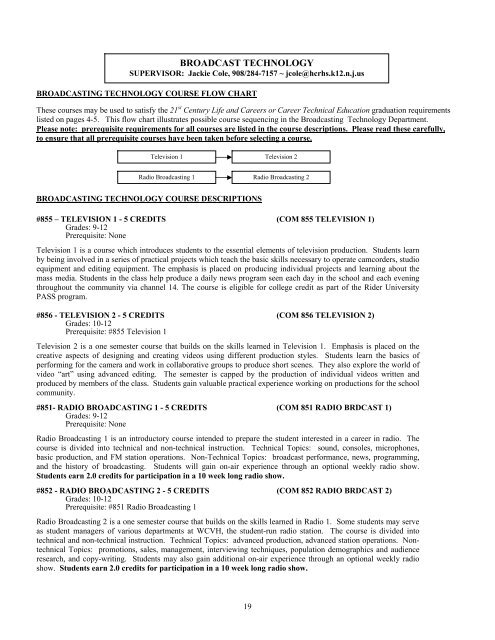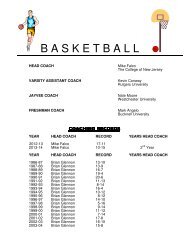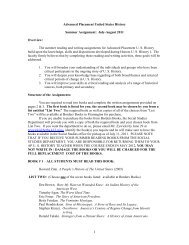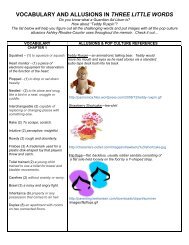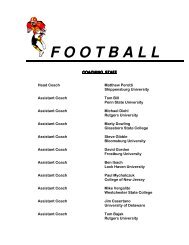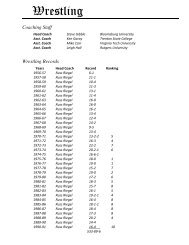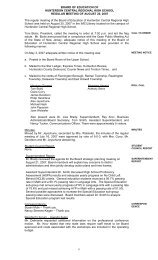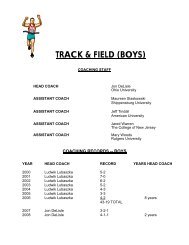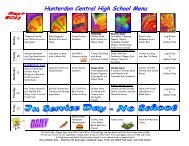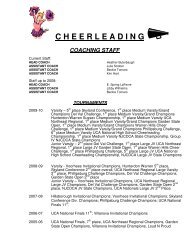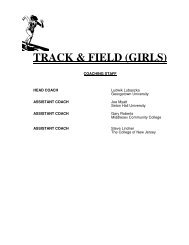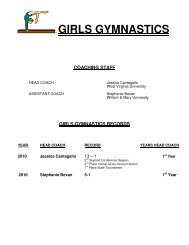Program of Studies - Hunterdon Central Regional High School
Program of Studies - Hunterdon Central Regional High School
Program of Studies - Hunterdon Central Regional High School
You also want an ePaper? Increase the reach of your titles
YUMPU automatically turns print PDFs into web optimized ePapers that Google loves.
BROADCAST TECHNOLOGY<br />
SUPERVISOR: Jackie Cole, 908/284-7157 ~ jcole@hcrhs.k12.n.j.us<br />
BROADCASTING TECHNOLOGY COURSE FLOW CHART<br />
These courses may be used to satisfy the 21 st Century Life and Careers or Career Technical Education graduation requirements<br />
listed on pages 4-5. This flow chart illustrates possible course sequencing in the Broadcasting Technology Department.<br />
Please note: prerequisite requirements for all courses are listed in the course descriptions. Please read these carefully,<br />
to ensure that all prerequisite courses have been taken before selecting a course.<br />
Television 1 Television 2<br />
Radio Broadcasting 1 Radio Broadcasting 2<br />
BROADCASTING TECHNOLOGY COURSE DESCRIPTIONS<br />
#855 – TELEVISION 1 - 5 CREDITS (COM 855 TELEVISION 1)<br />
Grades: 9-12<br />
Prerequisite: None<br />
Television 1 is a course which introduces students to the essential elements <strong>of</strong> television production. Students learn<br />
by being involved in a series <strong>of</strong> practical projects which teach the basic skills necessary to operate camcorders, studio<br />
equipment and editing equipment. The emphasis is placed on producing individual projects and learning about the<br />
mass media. Students in the class help produce a daily news program seen each day in the school and each evening<br />
throughout the community via channel 14. The course is eligible for college credit as part <strong>of</strong> the Rider University<br />
PASS program.<br />
#856 - TELEVISION 2 - 5 CREDITS (COM 856 TELEVISION 2)<br />
Grades: 10-12<br />
Prerequisite: #855 Television 1<br />
Television 2 is a one semester course that builds on the skills learned in Television 1. Emphasis is placed on the<br />
creative aspects <strong>of</strong> designing and creating videos using different production styles. Students learn the basics <strong>of</strong><br />
performing for the camera and work in collaborative groups to produce short scenes. They also explore the world <strong>of</strong><br />
video “art” using advanced editing. The semester is capped by the production <strong>of</strong> individual videos written and<br />
produced by members <strong>of</strong> the class. Students gain valuable practical experience working on productions for the school<br />
community.<br />
#851- RADIO BROADCASTING 1 - 5 CREDITS (COM 851 RADIO BRDCAST 1)<br />
Grades: 9-12<br />
Prerequisite: None<br />
Radio Broadcasting 1 is an introductory course intended to prepare the student interested in a career in radio. The<br />
course is divided into technical and non-technical instruction. Technical Topics: sound, consoles, microphones,<br />
basic production, and FM station operations. Non-Technical Topics: broadcast performance, news, programming,<br />
and the history <strong>of</strong> broadcasting. Students will gain on-air experience through an optional weekly radio show.<br />
Students earn 2.0 credits for participation in a 10 week long radio show.<br />
#852 - RADIO BROADCASTING 2 - 5 CREDITS (COM 852 RADIO BRDCAST 2)<br />
Grades: 10-12<br />
Prerequisite: #851 Radio Broadcasting 1<br />
Radio Broadcasting 2 is a one semester course that builds on the skills learned in Radio 1. Some students may serve<br />
as student managers <strong>of</strong> various departments at WCVH, the student-run radio station. The course is divided into<br />
technical and non-technical instruction. Technical Topics: advanced production, advanced station operations. Nontechnical<br />
Topics: promotions, sales, management, interviewing techniques, population demographics and audience<br />
research, and copy-writing. Students may also gain additional on-air experience through an optional weekly radio<br />
show. Students earn 2.0 credits for participation in a 10 week long radio show.<br />
19


